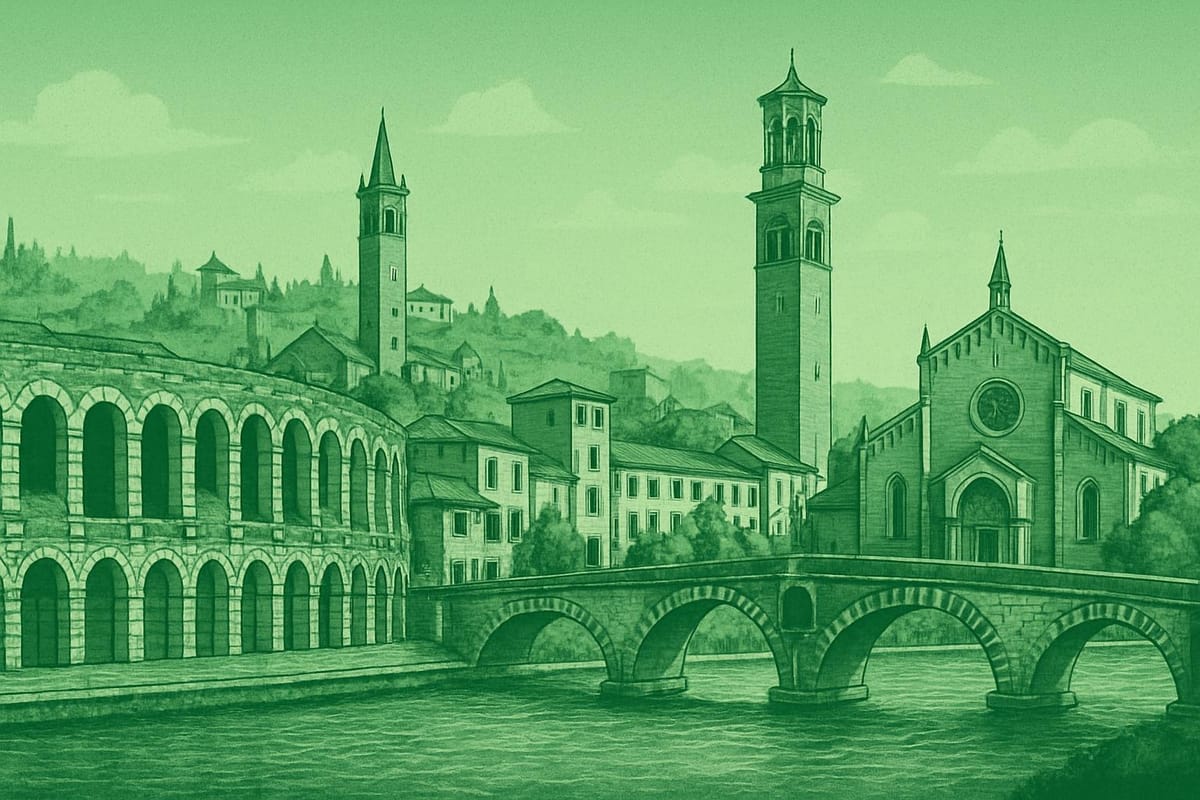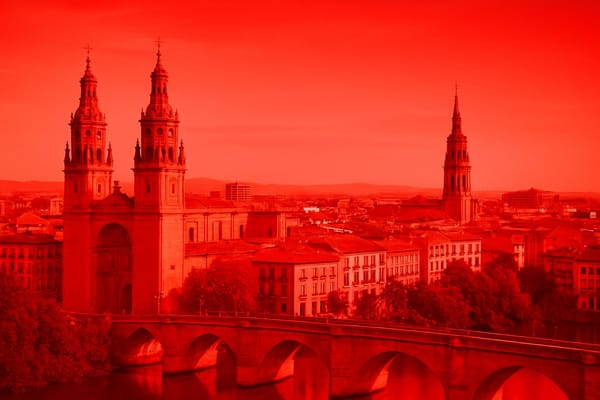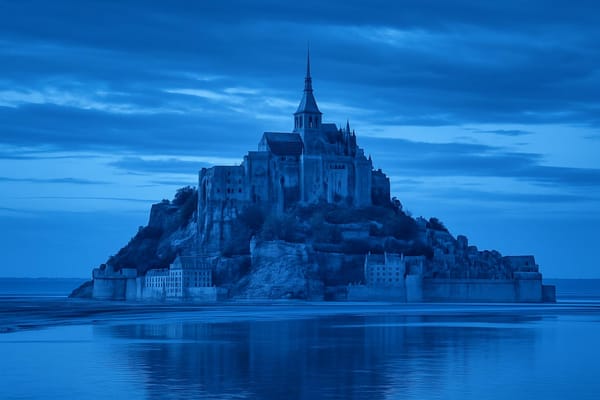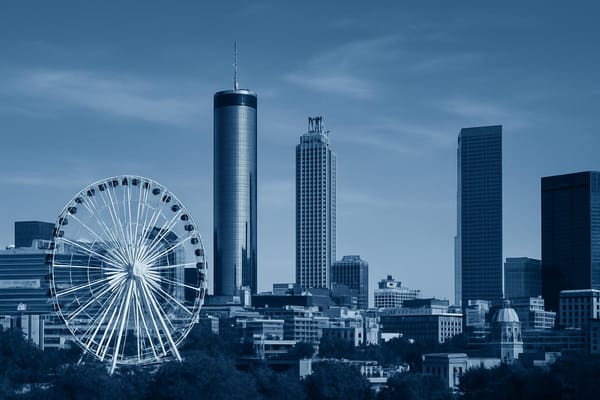Verona
Roman arena opera, Juliet's balcony, medieval streets & Amarone vineyards - timeless romance.

Important things to know about Verona
Verona, Italy, is a city where timeless charm and everyday life blend into a warm, authentic atmosphere that invites both visitors and locals to linger; the city of Verona unfolds along a gentle river and through winding streets where cafés, markets and family-run trattorie reflect a strong culinary tradition rooted in Veneto flavors and regional wines, while lively neighborhoods show how modern Verona culture adapts to contemporary tastes without losing its historic identity. In Verona the pace of life balances relaxed afternoons and vibrant evenings, with seasonal rhythms shaped by temperate Verona weather that fills outdoor terraces in spring and summer and softens into cozy indoor gatherings during cooler months. For those considering living in Verona, the city offers a mix of residential quarters from quiet tree-lined lanes to bustling urban hubs, good public transport links, and a local economy supported by small artisans, commerce and a growing service sector; real estate in Verona often attracts people seeking a high-quality Italian lifestyle with accessible countryside and good connections to larger cities. Education, gastronomy and community events sustain a sense of belonging, while local shops and markets promote sustainable choices and regional products; the cultural fabric of Verona is visible in everyday rituals, neighborhood festivals, and the careful preservation of architectural character that informs the city’s modern design sensibility. Whether you are exploring culinary scenes, assessing Verona nightlife, or simply imagining life amid its plazas and promenades, Verona presents a layered urban experience shaped by history, hospitality and a distinctive Veronese spirit.
Sightseeing hot-spots in Verona
Verona, Italy, is a city where ancient Roman grandeur and romantic medieval streets meet. The crown jewel is the Arena di Verona, a remarkably well-preserved Roman amphitheater that hosts world-class opera performances each summer, drawing visitors who want both historic architecture and cultural events. Wandering from the Arena into the surrounding Piazza Bra and the buzzing Piazza delle Erbe, you’ll find lively markets, elegant cafés, and layers of history visible in the façades and towers that define Verona’s skyline.
No visit to Verona is complete without a stop at Juliet’s balcony, the iconic Casa di Giulietta whose association with Shakespeare’s legend has made it a must-see for romantics. Beyond the theatrical allure, the city’s medieval defenses and art-rich museums are highlights: Castelvecchio and its bridge, the Museo di Castelvecchio, showcase medieval military architecture and a fine art collection, while the Torre dei Lamberti rewards climbers with sweeping views over the historic center. Meandering along the Adige River and crossing the ancient Ponte Pietra gives a sense of Verona’s strategic importance and timeless charm.
Verona’s compact historic center, declared a UNESCO World Heritage Site, is ideal for sightseeing on foot, with layers of Roman, medieval, and Renaissance attractions close together. From the peaceful cloisters of San Zeno Basilica to the quieter corners near the Roman Theater, every street feels photogenic and search-engine-friendly for travelers planning Italian itineraries. Whether you prioritize opera at the Arena, literary pilgrimage to Juliet’s home, or simply savoring local cuisine in a sunlit piazza, Verona delivers memorable experiences that rank high among the top destinations in northern Italy.
Hotels to enjoy in Verona
Verona is a timeless city where hotels in Verona, Italy blend historic charm with modern comfort, making it a top choice for travelers seeking culture and convenience. Many Verona hotels occupy restored palazzos and seafront-style buildings near landmarks such as the Arena di Verona, Juliet's House, and Piazza Bra, offering guests immediate access to Roman architecture, intimate wine bars, and cobblestone streets. Whether you prefer a boutique hotel with locally sourced breakfasts and artisan decor, a luxury stay with spa services and river views, or a budget-friendly option close to public transport, the city’s accommodation options suit romantic weekends, family vacations, and solo explorations alike. Staying in the historic center allows travelers to walk to museums like Castelvecchio and enjoy evening opera performances without long commutes, while hotels slightly further out often provide quieter streets and attractive rates.
When planning a trip, factors like seasonality and events will affect availability and rates: the summer opera season and trade fairs can drive demand, so it’s wise to book early if you want a room with a balcony overlooking the Arena or an intimate suite in central Verona. Many properties cater to specific needs-business centers, family rooms, pet-friendly policies, and airport shuttles to Verona Villafranca-so checking amenities helps match expectations. Look for hotels that highlight free Wi‑Fi, complimentary breakfast, and convenient proximity to the train station for day trips to Lake Garda. With a mix of historic ambience, contemporary facilities, and strategic locations across the city, finding the right Verona hotel can transform a standard stay into an authentic Italian experience.
Restaurants to try in Verona
Verona’s dining scene combines medieval charm with contemporary flair, making restaurants Verona a magnet for food lovers across Italy and beyond. Cobblestone streets lead from the Arena di Verona to intimate courtyards where trattoria and osteria kitchens turn out timeless Veronese recipes alongside inventive tasting menus. Whether you choose a romantic table in Piazza Bra or a riverside seat on the Adige, Verona restaurants showcase the best of Veneto produce-olive oil, seasonal vegetables, and local cheeses-paired expertly with the region’s celebrated wines like Amarone and Valpolicella. The city’s gastronomic identity is balanced between rustic comfort-think polenta and cured meats-and polished fine dining experiences where chefs reinterpret classics such as risotto all'Amarone with modern technique.
Exploring the top Verona restaurants means sampling both neighborhood gems and high-end establishments concentrated near Piazza delle Erbe and the historic center around Juliet’s balcony. For SEO-savvy travelers searching for authentic Italian food, look for places advertising traditional menus, small-batch wines, and open kitchens that emphasize local sourcing. Reservations are recommended during opera season at the Arena, when demand for memorable meals spikes; many venues also offer seasonal tasting menus highlighting fresh river fish, wild game, and handmade pasta. Whether you’re seeking a cozy osteria for a candlelit dinner or a contemporary restaurant for a multi-course feast, Verona delivers a culinary journey where every course tells a piece of the city’s history and where the pairing of food and Amarone elevates the experience.
Best shopping stops in Verona
Verona is a treasure trove for those seeking the best shopping in Verona, where cobbled streets and elegant arcades blend history with style. Strolling along Via Mazzini and through Piazza delle Erbe, visitors find a vibrant mix of high-end Italian fashion houses, independent boutiques, and charming artisanal shops that sell hand-made leather goods, ceramics, and gold jewelry crafted by local goldsmiths. For lovers of food and wine, specialty stores offer regional delights like Amarone and balsamic vinegar alongside delicatessens with truffles and olive oil. The experience of shopping highlights of Verona often includes discovering tucked-away studios where artisans demonstrate age-old techniques, giving shoppers the chance to buy authentic souvenirs that reflect Verona’s rich cultural heritage.
Beyond the historic center, Verona’s retail scene expands to elegant department stores and contemporary concept shops, making it a destination for both luxury seekers and bargain hunters. Fashion-forward visitors will appreciate seasonal collections and timeless Italian tailoring, while those searching for gifts can explore markets and pop-up events celebrating local design. With friendly shopkeepers, picturesque backdrops such as the Roman Arena nearby, and a calendar of cultural events that spill into shop windows and display cases, shopping in Verona becomes more than a purchase - it’s an immersive taste of Veneto lifestyle and craftsmanship that keeps travelers returning for more.
Nightlife highlights in Verona
Verona nightlife comes alive as the sun sets over the Arena di Verona, where summer opera performances draw crowds for an unforgettable evening under the stars. After the show, locals and visitors head to Piazza Bra and Piazza delle Erbe for an aperitivo-a pre-dinner drink paired with small plates-at stylish bars and historic cafes. The city’s compact center makes it easy to stroll between atmospheric cobbled streets, stopping at intimate wine bars and enotecas that showcase Valpolicella and Amarone. For a romantic night, couples often walk along the Adige River, enjoy the illuminated bridges, and snap photos at Juliet’s Balcony, which takes on a quieter, more magical air after dark.
For those seeking entertainment, Verona offers a mix of cozy jazz clubs, lively pubs, and modern nightclubs where DJs spin late into the night, catering to both the student crowd and international visitors. Live music venues host folk, blues, and contemporary acts, while wine cellars and rooftop terraces provide serene spots for conversation and people-watching. Food lovers can indulge in late-night cicchetti or gelato while exploring the illuminated historic center. Whether you prefer cultured evenings at the opera, a casual bar crawl, or dancing until dawn, the nightlife in Verona, Italy blends history, flavor, and vibrant local energy.
Getting around in Verona
Verona’s airport and train situation is convenient and well connected for travelers: Verona Villafranca (Valerio Catullo) Airport sits about 12 km from the city center and is served by regular airport shuttle buses and taxis, making the transfer to Verona Porta Nuova train station a straightforward 20–30 minute journey in normal traffic; rental cars and private transfers are also widely available for visitors heading to Lake Garda or regional destinations. At Verona Porta Nuova, passengers find a major hub with frequent regional and high-speed trains linking Verona to Venice, Milan, Bologna and other Italian cities, allowing efficient day trips and onward travel across Italy. Train services range from local commuter options to fast Frecciarossa and Italo connections, providing flexible schedules for both business and leisure travelers, while local buses and trams support last-mile mobility within the city. For SEO-focused travelers searching for “Verona airport”, “Verona train station” or “train connections to Venice”, the combination of a compact airport, reliable airport shuttle, and robust rail network ensures easy planning and quick access to northern Italy’s major attractions.
Culture must-see's in Verona
Verona is a jewel of northern Italy where Roman grandeur and medieval charm meet a lively contemporary cultural scene. Visitors are often drawn to the iconic Arena di Verona, the remarkably preserved Roman amphitheater that stages world-famous opera performances each summer and anchors the city’s reputation as a top cultural destination. Strolling through the historic center, a UNESCO World Heritage site, reveals cobbled streets, ornate piazzas like Piazza Bra, and the fabled Juliet’s Balcony that keeps Shakespeare’s romance alive for millions of tourists. Art lovers will find frescoed churches, elegant palazzi, and intimate galleries that illustrate Verona’s role as a crossroads of Venetian, Lombard, and classical influences, while street life and seasonal festivals showcase the city’s living traditions.
Beyond its architectural treasures, Verona offers rich museum collections and cultural programming that highlight both local history and broader Italian arts. The Castelvecchio Museum and Teatro Romano present archaeological finds and visual art alongside performances and exhibitions that change throughout the year, making every visit distinct. Verona’s culinary culture-paired with nearby Valpolicella wines-further enriches the experience, blending regional flavors with centuries-old dining customs. For travelers searching for unforgettable Italy cultural highlights, Verona balances celebrated landmarks, vibrant performing arts, and everyday Italian elegance, ensuring a culturally immersive and photogenic stay that resonates with history and contemporary life.
History of Verona
Verona’s story begins long before it became synonymous with romance and opera; the strategic bend of the Adige River invited settlement from prehistoric times and grew into a major hub under the Roman Republic and Empire. As part of the history of Verona, Roman engineers laid out the city with grand public spaces and roads like the Via Postumia, and left enduring monuments such as the Arena di Verona-a vast Roman amphitheatre that still hosts spectacular performances. The Roman forum, theatre, and city walls established an urban core that would be reused and reimagined across the centuries, and the continuity of these structures is a central theme in Verona’s architectural tapestry. During Late Antiquity and the early medieval period, Verona’s control shifted among Goths, Byzantines, Lombards, and Franks, each leaving traces in fortifications, religious foundations, and the evolving street plan. The city’s layered past is visible in its stone and layout, reflecting a continuous occupation that enriches the modern visitor experience and supports strong Verona tourism interest in its ancient heritage.
The medieval and Renaissance chapters of the history of Verona are defined by local dynasties and external powers that shaped its skyline and civic institutions. The powerful Scaliger family fortified the city, constructing bridges and castles such as the iconic Ponte Scaligero, while Gothic palaces and Romanesque churches marked civic pride. Later, Venetian domination brought Renaissance refinement and integration into wider trade networks, and subsequent Napoleonic and Austrian rule introduced new administrative and cultural layers until Verona joined unified Italy in the 19th century. Cultural fame swelled with Shakespeare’s choice of Verona for Romeo and Juliet, turning a modest medieval house into a focal point for lovers and a staple of things to see in Verona. Today Verona’s well-preserved historic center, recognized by UNESCO World Heritage status for its urban continuity and architecture, attracts visitors to both ancient monuments and vibrant cultural events, from the summer opera season in the Arena to street-level cafés. The city’s ability to fuse Roman engineering, medieval fortitude, Renaissance elegance, and modern cultural life ensures that the history of Verona remains a compelling beacon for scholars, tourists, and lovers of art and architecture alike.



